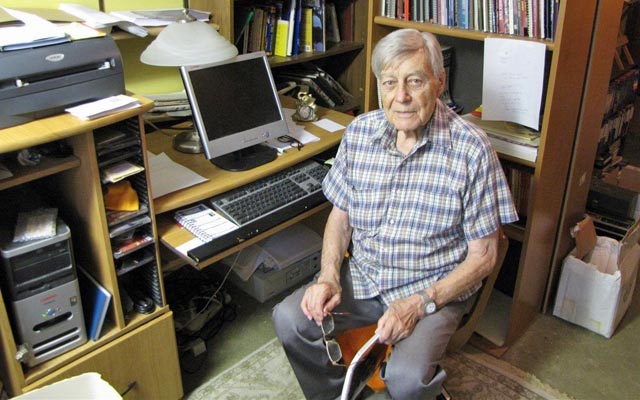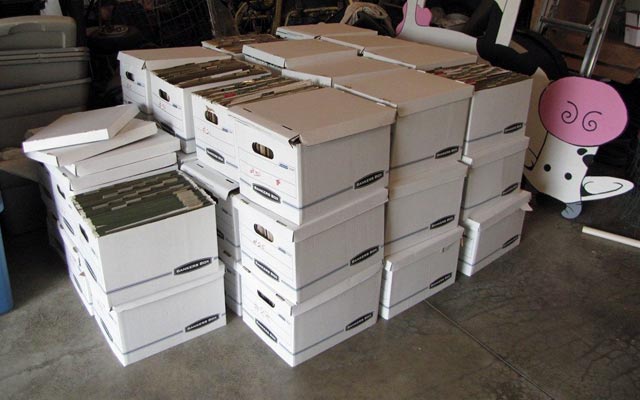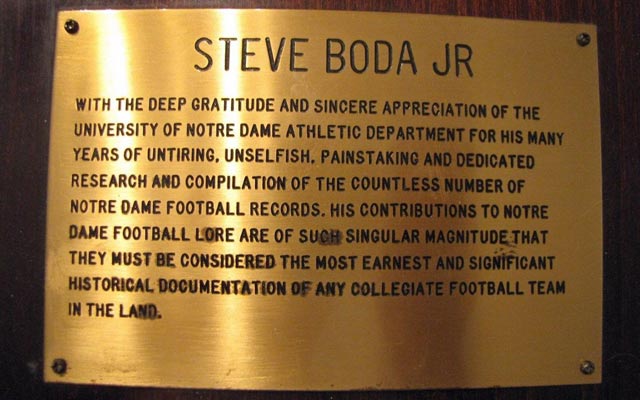SHAWNEE, Kan. -- The second-biggest love of Steve Boda's life is locked up in a storage shed.
In a sad, forlorn way, that seems fitting for a man who died on Nov. 18, 2014, in near anonymity. For 40 years, Boda was a statistician and researcher at the NCAA. Records you will hear referenced on broadcasts to this day were meticulously researched and crafted by a man who was as quiet as those numbers on the page.
"In the 40 years that I knew him, I don't think I ever heard him raise his voice," said Jim Wright, a now-retired former NCAA head statistician. "Definitely an under-the-radar type guy."
So much so that when Boda passed away three-and-a-half months ago at age 90, there were close friends who did not find out until late February. There were few next of kin to contact. The converted Catholic was buried without a funeral service or memorial. According to a person handling his estate, the man still owes for his own cremation and hospice care.
There was no obituary in the local paper. Until last week, a funeral chapel website announcing his passing contained one comment.
An 84-year old brother, Bob -- the youngest and only remaining of five siblings -- lives in Madison, Wis.
"He was alone at the end," said Bob of his brother.
But Steve Boda was a giant of a man in the relatively mundane world of sports number-gathering and statistic-crunching. He never sought the spotlight, but in a lot of ways, he created it. In that corner of all of our souls where hopes and dreams form, Boda had a wish. It was in his will.
That lone want was for those massive files -- now locked up in a Stilwell, Kan., storage park -- be donated to Notre Dame.
Anyone who knew him well enough knew about those files. Next to his beloved wife of 50 years, Juanita, they were the love of his life. They were a hobby/obsession that defined him and the university he came to love.
Juanita died in 2001. Now those files, like Boda, are gone, too.
"Notre Dame," Boda told an Irish publication in 2011, "saved my life."

While in an orphanage, Notre Dame football sustained him. He began charting Notre Dame games off the radio in the 1930s. That led to keeping stats in high school. That got him noticed by former Irish sports information director Joe Petritz. In 1975, Boda moved from New York when the NCAA relocated its statistics operations to Mission, Kan.
The hobby/obsession continued to flourish. You can glance the files here in this video.
They may represent the most extensive Notre Dame football history ever assembled. They contain the all-time lineups at Notre Dame, including every Irish player who stepped on the field for at least a second, all the way back to the first game in 1887. Game accounts, play charts ... it goes on.
Steve Boda worked at the NCAA. On the side, he created perhaps the largest historical record of the most famous college football program in existence.
"[He] may have more historical records about Notre Dame football than we do," Notre Dame senior associate athletic director John Heisler once said.
Those extensive records currently sit in a rural Kansas storage facility because -- in the end -- it appears that Boda needed the money.
Local memorabilia collector Ron Brown told CBSSports.com that he recently paid Boda $3,000 as a cash advance for the files on consignment. That means Boda could have profited if Brown was able to sell the files for anything more than that amount. Until then, Brown has them safely locked away in storage.
At the moment, the files have not sold. Boda, Brown said, hoped for a price of $20,000. As of Wednesday, they were listed on eBay for $11,191.
There are no current bids, and the price is dropping. Brown says he has a computer program that continually decreases the asking price by seven percent after a certain period of time.
If the files sell, "I have to settle with the estate for the difference," Brown said. "My fear is that I won't get my retainer back."
As for Boda's love of Notre Dame, Brown added, "Evidently his cash needs exceeded his philanthropy."
That statement stings. Brown isn't some low-life taking advantage of a senior citizen. They had a professional relationship that went back a decade, Brown said.
But Boda had to be heartbroken that his financial predicament forced him to sell off the collection. His research was so revered at Notre Dame that, for a period of years, Boda's phone number was printed in reverse in the media guide. Why? In case there was a question during a game, Irish staffers in the press box could call him immediately.
A Notre Dame source says that, in his later years, Boda had offered to part with the collection anytime if Notre Dame could send someone to haul it away. In the haze of the everyday, it never got done.
On the eBay listing, Brown declares there are nearly 70 boxes of file folders detailing games from 1887-1995, along with 200 VHS tapes.
"This is the just the only record of it's kind ANYWHERE," Brown wrote on the site.

If a single person can raise $4.3 million to buy the original rules of basketball for Kansas to display, you have to think there is a Notre Dame supporter willing to spring those files from a storage shed for around $12,000.
It was only coincidence that Boda was born in the same hospital where George Gipp had died four years earlier, St. Joseph in South Bend, Ind. Boda and his four siblings spent part of their childhood in that Indiana orphanage. When his mother died in 1933, Boda's father didn't have the means during the Great Depression to raise his children.
"The [orphanage] used to kind of rent out kids to farmers in the area," Bob Boda recalled. "They'd rent out my sister to some farmer. She didn't particularly like that. She ran away a few times."
While other kids at the Indiana Soldiers' and Sailors' Children's Home were outside playing, Steve religiously charted Irish games off the radio. He was hooked. His father had taken him to his first game in 1930.
An inscription in a Notre Dame plaque honoring his work stated that his research, "must be considered the most earnest and significant historical documentation of any collegiate football team in the land."
That was in 1965.

By several accounts, Boda was healthy up until October when he was rushed to the hospital. He never made it out. The house in Shawnee that he and Juanita shared now sits in disrepair -- seven old newspapers scattered in the driveway. His beloved cat, Duffy, has been adopted.
Wright called the Notre Dame files "priceless." But how do you put a price on a marriage that lasted a half century?
"For at least four or five years after she passed, Steve did not have the heart to change the message on their answering machine," Wright said. "That was [Juanita's] voice on it."
If this is Steve Boda's obituary, it ends with a great man and professional who simply struggled in the end. Boda had assigned his power of attorney to a female friend his age who now can't help because she is in assisted living. According to that woman's daughter, Janna Stueve, Boda was overextended on a reverse mortgage.
"One of the neighbors thought he had been selling stuff off to live day-to-day," Stueve said.
The exact cause of death isn't clear. The hospital mentioned something about a stroke, she said. The funeral home won't release the death certificate until it gets paid for the cremation, Stueve noted. The funds can't be released until there is a death certificate.
Around and around it goes.
If the collection does not sell in a year or so, Brown plans to begin selling it off piece by piece.
That would be a terrible end. Boda's legacy -- football history -- will be lost.
They remember him fondly at the NCAA as the guy who showed up at 4 a.m. on Sundays to begin assembling football stats during the season. That was in the 1970s, when key punch operators were hired to input the data.
They remember him as the guy who showed up at 6 a.m. every other day, first to work. They remembered the NCAA parties where the quiet, reserved Boda would dance with the outgoing Juanita.
Thank goodness, they remember him at all.
"Here's a guy who contributed so much to the NCAA," Wright said, "but apparently passed away in anonymity because there was nobody left to mourn his passing."





















